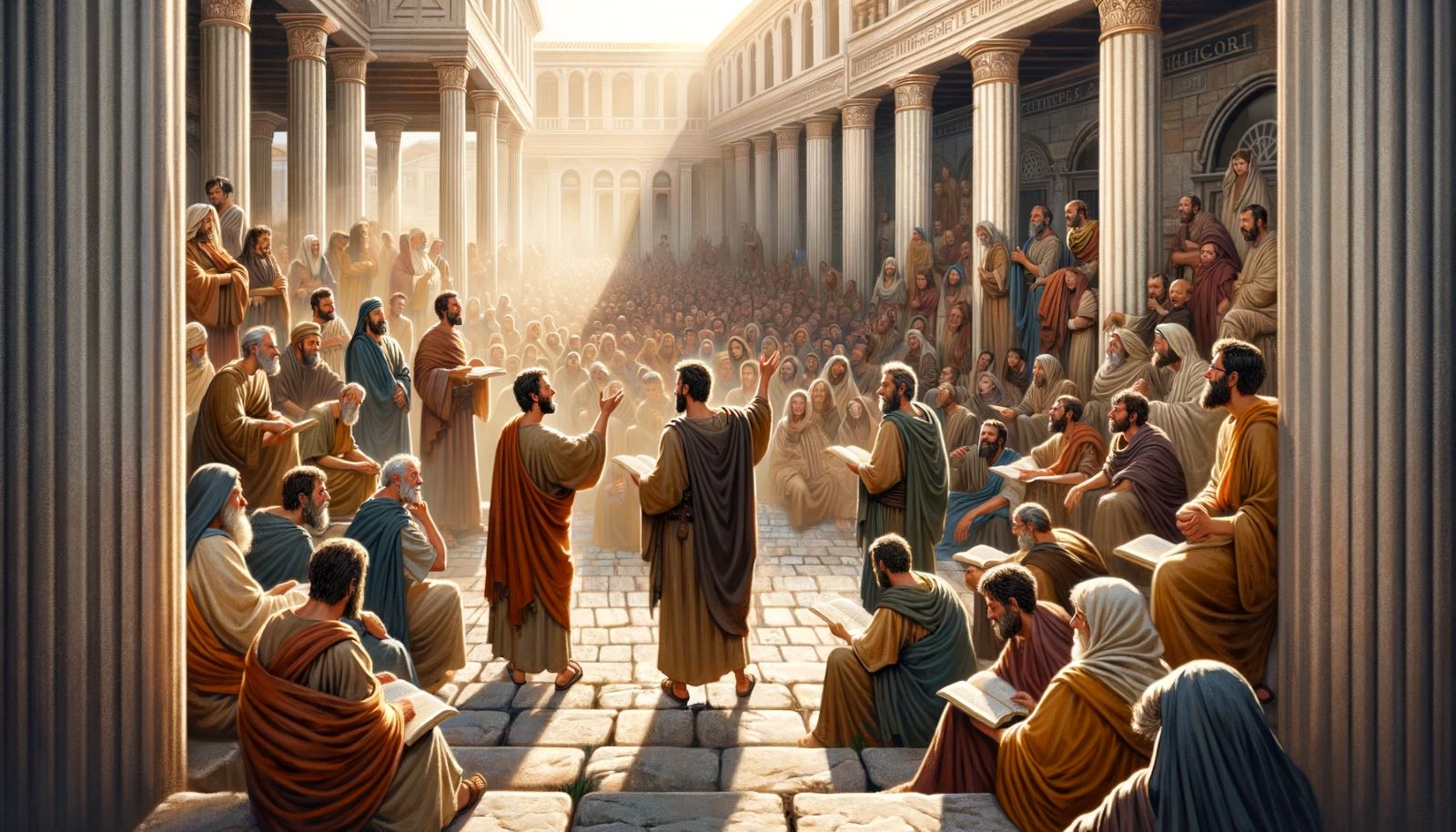Home>Bible Facts>What Did Jesus Tell The Apostles To Do


Bible Facts
What Did Jesus Tell The Apostles To Do
Published: February 22, 2024
Jason DeRose, Managing Editor at Christian.net, uses his expertise in religion and journalism to deepen understanding of faith's societal impacts. His editorial leadership, coupled with a strong academic background, enriches the platform’s diverse content, earning him recognition in both journalism and religious circles.
Discover the essential Bible facts about what Jesus instructed the apostles to do. Explore the teachings and significance of this pivotal moment in Christian history. Gain a deeper understanding of the apostles' mission and its relevance today.
(Many of the links in this article redirect to a specific reviewed product. Your purchase of these products through affiliate links helps to generate commission for Christian.net, at no extra cost. Learn more)
Table of Contents
Introduction
The teachings of Jesus Christ have had a profound impact on the world for over two millennia. His message of love, compassion, and redemption continues to inspire and guide millions of people across the globe. One of the most pivotal moments in Jesus' ministry was when he imparted a crucial directive to his apostles, known as the Great Commission. This commission not only encapsulates the essence of Jesus' teachings but also serves as a timeless mandate for all believers.
The Great Commission represents a call to action, a divine charge to spread the message of salvation and disciple all nations. It embodies the essence of Christianity, encapsulating the core principles of faith, evangelism, and discipleship. Understanding the significance of this commission provides invaluable insight into the mission and purpose of the Christian faith.
As we delve into the details of the Great Commission, we will uncover the profound significance of Jesus' words to his apostles. This pivotal moment serves as a cornerstone of Christian faith, shaping the beliefs and practices of believers throughout history. By exploring the intricacies of this directive, we gain a deeper understanding of the responsibilities entrusted to the apostles and, by extension, to all who follow in their footsteps.
The Great Commission is not merely a historical event but a living mandate that continues to resonate in the hearts of believers today. It challenges us to embrace the call to share the gospel, make disciples, and teach others the ways of Christ. As we embark on this exploration of Jesus' directive to the apostles, we will uncover the timeless relevance and enduring impact of the Great Commission on the Christian faith and the world at large.
Read more: What Did The Apostles Do?
The Great Commission
The Great Commission stands as a pivotal moment in the ministry of Jesus Christ, marking the culmination of his earthly mission and the beginning of a new chapter for his disciples. As recorded in the Gospel of Matthew, Jesus, after his resurrection, gathered his eleven remaining apostles on a mountain in Galilee and delivered a profound mandate that would shape the course of history. This directive, known as the Great Commission, embodies the essence of Jesus' teachings and serves as a guiding light for all who profess faith in him.
In this defining moment, Jesus charged his apostles with a monumental task: to go and make disciples of all nations, baptizing them in the name of the Father, the Son, and the Holy Spirit, and teaching them to obey all that he had commanded. This commission transcends geographical and cultural boundaries, encompassing the entirety of humanity in its scope. It underscores the universal nature of the gospel and the inclusive invitation to all people to partake in the redemptive message of Christ.
The Great Commission encapsulates the core mission of the Christian faith, emphasizing the imperative to proclaim the good news of salvation and to nurture a community of believers who are committed to following the teachings of Jesus. It serves as a clarion call to evangelism, urging believers to share the transformative message of Christ with unwavering zeal and conviction. Moreover, the commission highlights the significance of baptism as a symbolic expression of faith and a public declaration of allegiance to the triune God.
Furthermore, the Great Commission underscores the vital role of teaching and discipleship in the life of the church. It compels believers to impart the teachings of Jesus to others, nurturing them in the ways of faith and guiding them to observe all that Christ has commanded. This aspect of the commission emphasizes the importance of spiritual mentorship and the cultivation of a vibrant, maturing community of believers who are firmly rooted in the principles of the gospel.
In essence, the Great Commission serves as a timeless mandate that reverberates through the corridors of history, beckoning believers to embrace their role as ambassadors of Christ to the world. It embodies the universal call to share the message of salvation, to initiate individuals into the community of faith, and to nurture them in the teachings of Jesus. This commission not only reflects the heart of Jesus for humanity but also imparts a sense of purpose and mission to all who heed its call.
Preach the Gospel
At the core of the Great Commission is the imperative to preach the gospel, a charge that resonates with timeless significance and enduring relevance. The act of preaching the gospel encompasses far more than mere verbal proclamation; it embodies a profound call to herald the transformative message of salvation, redemption, and reconciliation with God. This charge, entrusted to the apostles by Jesus himself, extends beyond the confines of their immediate context, transcending time and space to encompass all who profess faith in Christ.
Preaching the gospel entails the proclamation of the good news of Jesus Christ, a message that transcends cultural barriers, societal norms, and individual circumstances. It is a declaration of hope, grace, and divine love extended to all humanity, irrespective of background or status. The gospel stands as a beacon of light in a world shrouded in darkness, offering a pathway to reconciliation with God and restoration to wholeness.
Moreover, the act of preaching the gospel serves as a catalyst for transformation, igniting hearts and minds with the truth of God's redemptive plan. It is a call to awaken the spiritually dormant, to challenge the status quo, and to invite individuals into a life-altering encounter with the person of Jesus Christ. Through the proclamation of the gospel, lives are forever changed, destinies are redirected, and eternal hope is kindled in the hearts of those who embrace its message.
Furthermore, the mandate to preach the gospel underscores the universal scope of God's redemptive plan. It transcends geographical boundaries, cultural divides, and linguistic barriers, resonating with equal potency in the bustling metropolises and the remote corners of the earth. The gospel knows no exclusivity; it is a message for all people, inviting them to partake in the boundless grace and unmerited favor of God.
In essence, the call to preach the gospel encapsulates the essence of the Christian faith, embodying the fervent desire of God to reconcile humanity to Himself. It is a charge that beckons believers to become heralds of hope, ambassadors of reconciliation, and messengers of divine love. As we embrace this sacred mandate, we step into the legacy of the apostles, carrying forth the timeless message of salvation to a world in desperate need of its transformative power.
Baptize in the Name of the Father, Son, and Holy Spirit
Baptism, as ordained by Jesus in the Great Commission, holds profound significance within the Christian faith. It serves as a visible and symbolic expression of one's commitment to Christ and their identification with the triune God—Father, Son, and Holy Spirit. The act of baptism represents a spiritual union with Christ in his death and resurrection, signifying the washing away of sin and the emergence into newness of life.
The triune formula prescribed by Jesus—baptizing in the name of the Father, the Son, and the Holy Spirit—underscores the foundational doctrine of the Trinity within Christian theology. It affirms the divine nature of God as three distinct persons in perfect unity, each playing a unique role in the redemptive work of humanity. Through baptism, believers publicly acknowledge their faith in the triune God, embracing the profound mystery of the Father, Son, and Holy Spirit as the object of their devotion and worship.
Furthermore, baptism serves as a communal rite of initiation into the body of Christ, signifying the incorporation of individuals into the fellowship of believers. It symbolizes the spiritual rebirth and the entry into a new covenant relationship with God, marked by forgiveness, grace, and the indwelling of the Holy Spirit. As believers are immersed in the waters of baptism, they participate in a sacred act of identification with Christ, publicly declaring their allegiance to him and their participation in his redemptive work.
Moreover, baptism holds a transformative significance in the life of the believer, representing a decisive break from the old life and a commencement of a new journey in Christ. It symbolizes the burial of the old self and the resurrection into a life characterized by faith, obedience, and spiritual vitality. The act of baptism, therefore, serves as a tangible expression of the inward transformation that occurs through faith in Christ, marking the beginning of a life lived in communion with God and in fellowship with the body of believers.
In essence, the directive to baptize in the name of the Father, Son, and Holy Spirit embodies the sacred act of initiation and identification within the Christian faith. It signifies the believer's union with Christ, their incorporation into the community of faith, and their public proclamation of allegiance to the triune God. As such, baptism stands as a timeless testament to the transformative power of God's redemptive love and the enduring commitment of believers to walk in obedience and fellowship with their Lord and Savior.
Teach Others to Observe All That Jesus Commanded
Central to the Great Commission is the directive to teach others to observe all that Jesus commanded. This charge encompasses the vital aspect of discipleship within the Christian faith, emphasizing the impartation of Christ's teachings and the cultivation of a lifestyle characterized by obedience to his commands. It goes beyond the mere transmission of knowledge; rather, it embodies the nurturing of a transformative and obedient posture toward the teachings of Jesus.
Teaching others to observe all that Jesus commanded involves the comprehensive dissemination of his ethical, moral, and spiritual precepts. It encompasses the full spectrum of Christ's teachings, ranging from love, compassion, and forgiveness to righteousness, humility, and servanthood. This holistic approach to discipleship seeks to instill within believers a deep reverence for the words of Jesus and a steadfast commitment to embodying his principles in every facet of life.
Furthermore, this directive underscores the significance of modeling the teachings of Jesus through personal example. It necessitates a lived-out faith that authentically reflects the transformative power of Christ's words. By embodying the principles of love, grace, and integrity, believers become living testimonies to the enduring impact of Jesus' commands, thereby compelling others to embrace and emulate his teachings.
Moreover, the call to teach others to observe all that Jesus commanded extends beyond the confines of formal instruction; it permeates the fabric of everyday interactions, relationships, and communal gatherings within the body of believers. It fosters an environment where mutual edification, accountability, and encouragement serve as catalysts for spiritual growth and adherence to the teachings of Christ.
In essence, the mandate to teach others to observe all that Jesus commanded encapsulates the essence of discipleship within the Christian faith. It beckons believers to embrace the role of spiritual mentors, guiding others in the transformative journey of embodying the teachings of Jesus. This charge not only fosters a vibrant community of faith but also perpetuates the timeless relevance of Christ's words, ensuring that his teachings continue to shape and enrich the lives of believers across generations.
Read more: What Did Jesus Commission His Apostles To Do
Go and Make Disciples of All Nations
The profound directive to "go and make disciples of all nations" encapsulates the universal scope of the Great Commission. It represents a clarion call to believers, transcending geographical, cultural, and linguistic barriers, and beckoning them to carry the transformative message of Christ to every corner of the earth. This charge embodies the inclusive nature of the gospel, extending an invitation to people of all nations, tribes, and tongues to partake in the redemptive work of Jesus Christ.
The act of making disciples encompasses far more than mere conversion; it entails the nurturing of individuals in the teachings of Jesus, guiding them in the formation of a vibrant and maturing faith. It involves the investment of time, care, and spiritual mentorship, as believers walk alongside others in their journey of faith, imparting the timeless truths of the gospel and exemplifying the transformative power of Christ's love.
Furthermore, the call to make disciples of all nations underscores the global mandate of the Christian faith. It challenges believers to transcend cultural boundaries and societal norms, embracing the diversity of humanity and extending the message of hope and reconciliation to people from every background. This charge compels believers to adopt a global perspective, recognizing the inherent worth and value of every individual and their potential to become devoted followers of Christ.
Moreover, the directive to make disciples of all nations resonates with the enduring legacy of the apostles, who, empowered by the Holy Spirit, embarked on a mission that would forever alter the course of history. Their unwavering commitment to spreading the gospel to the farthest reaches of the known world stands as a testament to the transformative power of the Great Commission. As modern-day disciples, believers are called to emulate this fervent zeal and dedication, carrying forth the torch of faith to every nation, community, and individual who has yet to encounter the life-changing message of Jesus Christ.
In essence, the charge to make disciples of all nations embodies the expansive and inclusive nature of the gospel. It compels believers to embrace a global perspective, to invest in the lives of others, and to carry forth the transformative message of Christ to the ends of the earth. This timeless mandate continues to resonate in the hearts of believers, igniting a passion for global evangelism and the nurturing of vibrant, diverse communities of faith across the world.
Conclusion
The Great Commission, entrusted by Jesus to his apostles, stands as a timeless mandate that reverberates through the corridors of history, beckoning believers to embrace their role as ambassadors of Christ to the world. This pivotal directive encapsulates the essence of the Christian faith, emphasizing the imperative to proclaim the good news of salvation, to initiate individuals into the community of faith, and to nurture them in the teachings of Jesus. It embodies the universal call to share the message of salvation, to make disciples of all nations, and to cultivate vibrant, maturing communities of believers who are firmly rooted in the principles of the gospel.
At the heart of the Great Commission lies the transformative power of the gospel, a message that transcends cultural barriers, societal norms, and individual circumstances. It is a declaration of hope, grace, and divine love extended to all humanity, irrespective of background or status. The charge to preach the gospel compels believers to become heralds of hope, ambassadors of reconciliation, and messengers of divine love, igniting hearts and minds with the truth of God's redemptive plan.
Moreover, the directive to baptize in the name of the Father, Son, and Holy Spirit embodies the sacred act of initiation and identification within the Christian faith. It signifies the believer's union with Christ, their incorporation into the community of faith, and their public proclamation of allegiance to the triune God. Baptism serves as a tangible expression of the inward transformation that occurs through faith in Christ, marking the beginning of a life lived in communion with God and in fellowship with the body of believers.
The call to teach others to observe all that Jesus commanded fosters a vibrant community of faith and perpetuates the timeless relevance of Christ's words, ensuring that his teachings continue to shape and enrich the lives of believers across generations. This charge not only fosters a vibrant community of faith but also perpetuates the timeless relevance of Christ's words, ensuring that his teachings continue to shape and enrich the lives of believers across generations.
The charge to make disciples of all nations embodies the expansive and inclusive nature of the gospel. It compels believers to embrace a global perspective, to invest in the lives of others, and to carry forth the transformative message of Christ to the ends of the earth. This timeless mandate continues to resonate in the hearts of believers, igniting a passion for global evangelism and the nurturing of vibrant, diverse communities of faith across the world.
In essence, the Great Commission serves as a divine call to action, a mandate that transcends time and space, and a commission that empowers believers to participate in the ongoing work of God's kingdom. It is a charge that resonates with unwavering relevance, compelling believers to embody the transformative message of Christ and to extend the invitation of salvation to all humanity. As we heed the call of the Great Commission, we embrace our role as ambassadors of hope, bearers of divine love, and custodians of the timeless message that continues to change lives and shape destinies across the world.














